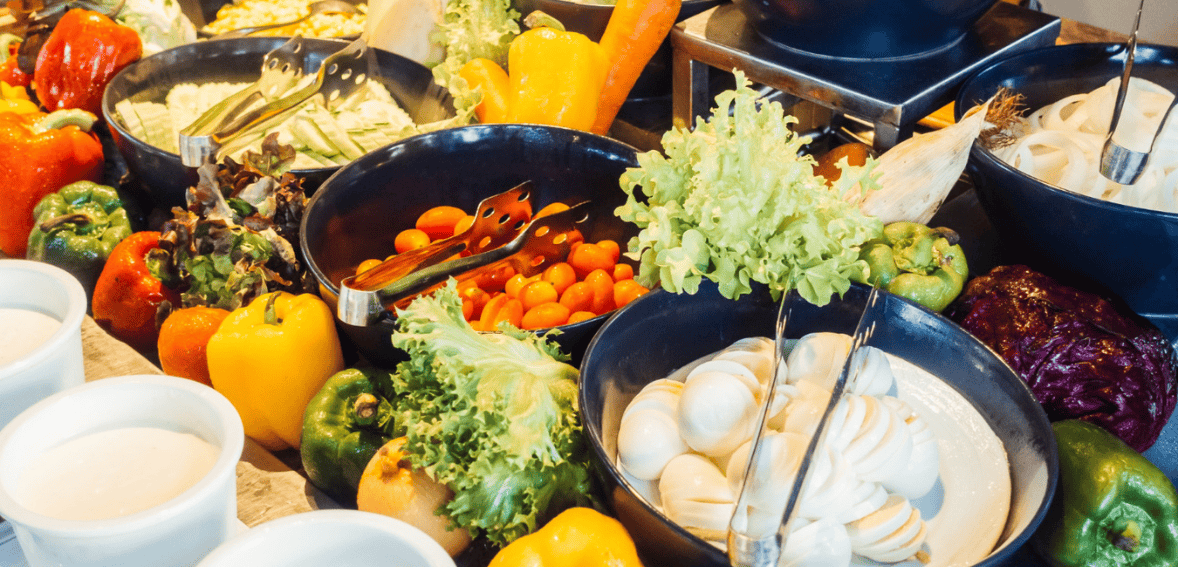
By Jermaine Thomas October 3, 2025
Food is more than just sustenance—it is a key driver of wellness, energy, and overall health. In recent years, there has been a noticeable shift in catering, with organizers and clients alike seeking options that not only satisfy hunger but also align with broader goals of health and sustainability. This shift has given rise to wellness catering trends, where menus are designed with the nutritional value of food in mind, and seasonal produce takes center stage. By using ingredients at their peak freshness, caterers can create meals that are rich in nutrients, vibrant in flavor, and environmentally responsible.
The concept of seasonal catering connects wellness with nature’s cycles. Instead of relying on imported produce grown out of season, chefs build healthy catering menus that highlight what local farmers can provide at any given time of the year. This approach not only delivers superior taste but also maximizes the health benefits for guests. Seasonal foods retain more vitamins and minerals, making them an important component of nutrition seasonal food strategies. As demand for healthier and more mindful choices grows, seasonal catering is proving that wellness and delicious dining can go hand in hand.
Why Seasonal Ingredients Enhance Nutrition
When food is harvested in season, it tends to be fresher, more flavorful, and packed with essential nutrients. Fruits and vegetables that ripen naturally in their growing season retain higher levels of vitamins, antioxidants, and minerals than those stored for months or shipped across long distances. This is why nutrition seasonal food practices are increasingly popular in catering. Guests benefit from meals that not only taste better but also provide genuine health value. Seasonal foods also tend to require fewer preservatives and artificial enhancements, which further supports overall wellness.
For caterers, incorporating seasonal produce into healthy catering menus allows them to showcase variety throughout the year. Spring may bring leafy greens and asparagus, while fall offers root vegetables and squashes. Each season carries unique nutritional benefits, giving clients diverse options that align with wellness catering trends. Beyond individual health, seasonal sourcing also reduces the carbon footprint of meals, as ingredients do not require extensive transportation. This connection between fresh nutrition and sustainability makes seasonal catering a holistic choice that benefits both people and the planet.
Healthy Catering Menus and Guest Satisfaction
In today’s dining culture, guests are more mindful of what they eat, and healthy catering menus directly respond to that demand. People attending events want food that supports energy, focus, and well-being rather than leaving them sluggish. Caterers who design menus with fresh vegetables, lean proteins, whole grains, and seasonal fruits create an experience that resonates with health-conscious guests. A menu filled with nutritious options not only satisfies dietary preferences but also enhances the overall perception of the event itself.
By incorporating nutrition seasonal food, caterers can balance health with flavor, ensuring that wellness does not come at the expense of enjoyment. Seasonal berries at summer weddings, hearty squash dishes in winter banquets, or crisp greens in spring luncheons all highlight the richness of seasonal choices. These approaches align with wellness catering trends that prioritize freshness and variety over heavy, processed meals. Guests are increasingly judging events by how food makes them feel afterward, and healthy seasonal catering delivers satisfaction that lasts beyond the meal itself.

Cost Benefits of Seasonal Sourcing
While the focus on seasonal catering is often framed around wellness, it also has economic advantages. Ingredients that are in season are usually more abundant, meaning they are less expensive for caterers to purchase. This allows businesses to design healthy catering menus that are both nutritious and cost-effective. For clients, this translates into value, as they can provide high-quality meals without inflating budgets unnecessarily.
By embracing nutrition seasonal food strategies, caterers also reduce reliance on imported items, which often come with higher costs due to transport and storage. Supporting local farmers further strengthens community ties while reducing environmental impact. These elements make seasonal sourcing a central part of wellness catering trends, as it proves that nutritious, high-quality meals do not have to be prohibitively expensive. This affordability ensures that wellness-focused catering is accessible for a wide range of events, from corporate meetings to weddings and community gatherings.
Aligning with Wellness Catering Trends
The rise of wellness catering trends is no coincidence—it reflects the growing awareness of health and sustainability among consumers. Guests want meals that align with their lifestyles, from plant-based diets to allergen-friendly options. Seasonal catering naturally complements these needs, as it offers variety, freshness, and nutrient-dense food that fits diverse preferences. For example, a spring menu can highlight detoxifying greens and lighter dishes, while autumn menus can incorporate warming, immune-boosting root vegetables.
Event planners increasingly prioritize caterers who can demonstrate expertise in healthy catering menus and nutrition seasonal food strategies. This emphasis on wellness is transforming catering from a basic service into an experience that reflects values of health, sustainability, and mindfulness. By staying aligned with these trends, caterers position themselves as forward-thinking and responsive to the evolving needs of their clients. In a competitive industry, embracing wellness through seasonal catering has become both a practical necessity and a defining feature of success.
Seasonal Foods and Immune Health
One of the strongest advantages of nutrition seasonal food lies in its ability to support immune health. Seasonal produce naturally aligns with the body’s nutritional needs during different times of the year. For example, citrus fruits harvested in winter are rich in vitamin C, which supports immunity during cold and flu season. Summer berries provide antioxidants that help combat oxidative stress during hot months. Caterers that incorporate these principles into healthy catering menus provide meals that do more than just fill plates—they support guests’ overall wellness.
This concept is deeply tied to wellness catering trends, which emphasize prevention and health promotion rather than indulgence alone. Guests appreciate meals that feel purposeful, nourishing, and responsive to seasonal health needs. Highlighting immune-supportive foods also differentiates caterers, showing their awareness of nutrition and their ability to go beyond standard offerings. In this way, seasonal catering transforms food from a passive part of events into an active contributor to wellness.
Reducing Food Waste Through Seasonal Menus
Food waste is a major concern in the catering industry, and wellness catering trends increasingly call for solutions that are both nutritious and sustainable. Seasonal sourcing naturally helps reduce waste because ingredients are fresher, last longer, and can be purchased in appropriate quantities from local suppliers. By using in-season produce, caterers also avoid the excess packaging and storage requirements often tied to imported foods.
When healthy catering menus are designed around what is readily available, caterers can plan more efficiently, minimizing spoilage. Guests also benefit because the meals they receive are fresher and more flavorful, a direct result of embracing nutrition seasonal food strategies. Reducing waste not only lowers costs but also enhances the environmental credibility of catering services. Clients are increasingly looking for vendors who align with values of sustainability, making waste reduction through seasonal catering a powerful selling point.

The Future of Seasonal Catering and Wellness
Looking ahead, the role of seasonal catering in wellness-focused dining will continue to grow. As more people adopt health-conscious lifestyles, the demand for healthy catering menus rich in fresh, nutrient-dense foods will only intensify. Caterers will be expected to integrate nutrition seasonal food strategies seamlessly, ensuring that meals are aligned with both health and environmental priorities. Clients will look for evidence that caterers are not only providing meals but also creating experiences that reflect broader values of wellness and sustainability.
Emerging wellness catering trends may also involve greater personalization, where menus are tailored to specific dietary needs or health goals of guests. Technology could further enable this shift, with apps or platforms that allow clients to track nutritional content or customize seasonal dishes in advance. As these changes unfold, caterers who embrace seasonal, wellness-focused menus will remain ahead of the curve, offering services that are both relevant and highly valued.
Cultural Influences on Seasonal Wellness Menus
Catering is increasingly influenced by cultural traditions that celebrate seasonal produce, and these practices provide inspiration for designing healthy catering menus that feel authentic and nourishing. Many cuisines already prioritize fresh, locally sourced ingredients, whether it is Mediterranean diets rich in summer vegetables or Asian traditions highlighting spring greens and fermented foods in colder months. Incorporating these cultural insights into catering ensures that nutrition seasonal food is not only health-conscious but also engaging and diverse for guests.
People are more likely to connect with meals that tell a story and reflect traditions rooted in wellness. As wellness catering trends evolve, blending cultural practices with modern nutritional awareness creates meals that are flavorful, meaningful, and aligned with global values of mindful eating. This fusion allows caterers to design menus that highlight the best of seasonal food while offering variety and inclusivity, making every event both nourishing and memorable.
Corporate Wellness and Seasonal Catering
In the corporate world, food choices are increasingly tied to employee productivity and well-being. Companies planning events or daily meal programs are now prioritizing healthy catering menus that energize rather than weigh down employees. Seasonal catering plays a major role here, as nutrition seasonal food options provide the freshness and nutrients necessary to maintain focus during long workdays or conferences. By emphasizing lighter, nutrient-dense dishes in summer and heartier, immune-boosting meals in winter, caterers can support the natural cycles of energy and health in the workplace.
This aligns strongly with wellness catering trends, where businesses recognize that food choices directly influence employee performance and morale. Offering seasonal, wellness-focused meals sends a message that organizations value their staff’s health, making events more enjoyable and fostering a culture of care. The result is not only healthier employees but also a stronger connection between catering and workplace wellness.
Event Personalization Through Seasonal Choices
One of the rising expectations in catering is personalization, and seasonal menus provide the perfect canvas for this trend. Guests attending events today want meals that reflect their personal preferences, dietary needs, and lifestyle goals. By leveraging healthy catering menus that rotate with the seasons, caterers can provide customizable options that feel fresh and tailored. For example, summer menus may include customizable fruit bowls or lighter salads, while winter menus can highlight warming soups and roasted vegetables.
These offerings demonstrate how nutrition seasonal food provides both structure and flexibility, allowing planners to satisfy diverse guest needs. Personalization is also at the heart of wellness catering trends, where meals are designed to make individuals feel seen and cared for. When guests leave an event feeling that the food reflected their needs and values, it creates a lasting impression. Seasonal catering allows for this kind of personalization without sacrificing quality or efficiency.
The Psychological Impact of Seasonal Wellness Dining
Food does not only affect physical health but also plays a powerful role in mood and mental well-being. Seasonal meals often carry associations with comfort, freshness, and celebration, which makes them deeply satisfying beyond their nutritional value. Designing healthy catering menus around seasonal produce taps into these psychological connections. For instance, fresh berries in summer may evoke joy and energy, while roasted root vegetables in winter bring warmth and comfort.
These connections demonstrate how nutrition seasonal food supports not just the body but also the mind. This emotional dimension is a growing part of wellness catering trends, where meals are valued not only for their nutrients but also for their ability to enhance overall experience and mood. By providing food that resonates emotionally, caterers elevate events from functional to memorable, making seasonal wellness dining a holistic offering that addresses body, mind, and spirit.
Conclusion
The rise of seasonal catering demonstrates that wellness, sustainability, and great food can coexist harmoniously. By designing healthy catering menus around fresh, local ingredients, caterers provide meals that are nutritionally rich and aligned with guests’ health goals. The principles of nutrition seasonal food not only enhance wellness but also reduce costs and environmental impact, making this approach both practical and impactful.
As wellness catering trends continue to shape the industry, seasonal sourcing is becoming more than a passing fad—it is a fundamental strategy for delivering value and satisfaction. Guests increasingly expect food that reflects mindfulness, sustainability, and health, and seasonal catering meets these expectations effortlessly. For caterers and event planners, embracing this approach ensures relevance, competitiveness, and the ability to create memorable experiences. Wellness on the plate is no longer optional; it is the standard for modern catering, and seasonal strategies are the key to achieving it.